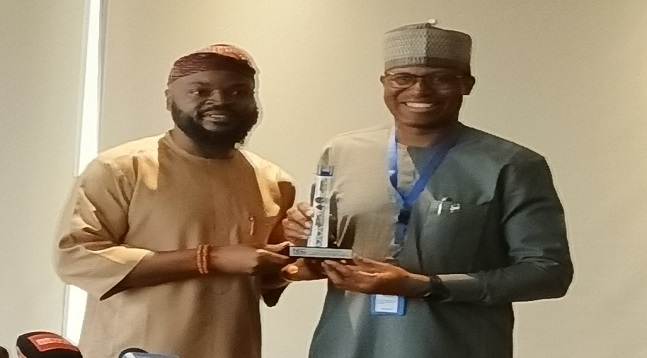Telecom
More Than Ever, Connectivity is Key says Ekholm

Börje Ekholm, President and CEO, Ericsson, has highlighted the importance of connectivity during times of crisis and the opportunity we now have to rethink the role of networks in the future.

Speaking from his home over a videoconference link, Ekholm delivered a keynote speech that kicked off a new series of online events, the Ericsson UnBoxed Office.
“Our absolute highest priority remains the health, safety and wellbeing of our employees, our customers and our partners,” said Ekholm reflecting on the ongoing COVID-19 crisis. “We are working hard to do what we can to contribute to the efforts to contain and slow down the pandemic.”
Ekholm stressed the importance of strong and reliable communications networks in the current environment and on staying close to customers and providing them with the best possible connectivity and network quality.
“Even when a country goes into lockdown, our engineers are still active in order to keep the networks up and running,” he says.
Ekholm provided a few examples of where Ericsson engineers have been on the front-line providing support for essential services including connectivity for hospitals in Wuhan, China and contributing to an AI data challenge with the US government.
He also highlighted the transformative changes that have been going on in the networks over the past 2 months. That shift has seen traffic move rapidly from business areas to residential areas over just a matter of days. In many networks, traffic has increased upwards of 20 percent.
Even with stay at home orders in place over much of the globe, Ericsson was able to move employees who operate customer networks from our global Network Operation Centers to home with zero impact on performance levels.
Ericsson made the transition to remote work globally already at the beginning of March and now has 85,000 employees routinely working from home.
The importance of network quality
“More than ever, connectivity is key. With the spread of COVID-19, fixed and mobile telecommunications networks have become an even bigger part of the critical infrastructure, showing the importance of quality in the connectivity,” says Ekholm.
In a recent study based on 4G life cycle data from more than thirty countries, Ericsson analyzed the correlation between network quality and financial performance. The conclusion: network quality is a powerful way to drive lower churn rate and increase the average revenue per user (ARPU).
“When we looked across all service providers, not just leaders, network quality correlated with increased ARPU and reduced churn. Put simply, investing in network quality keeps subscribers happy.”
5G offers service providers an opportunity to gain first-mover advantage and create a significant network performance gap with the competition.
“We are already seeing early signs of service providers monetizing the 5G opportunity, with positive ARPU trends and growing revenues in pioneering 5G markets,” says Ekholm.
The future of 5G
Given the importance of connectivity, and 5G in particular as critical national infrastructure, Ekholm believes that it is in the public interest to ensure that pervasive, high quality, affordable and secure networks are available when and wherever they may be required.
“5G will unlock the potential of the Fourth Industrial Revolution and will be the cornerstone upon which a country’s relative competitiveness is built. While 4G gave us the app economy, 5G will be the greatest open innovation platform ever,” he says.
Ekholm adds that 5G will drive exponential public and private sector value including efficiencies in public services and new and more effective modes of delivery, for example in healthcare, education, transport and disaster control.
“It is vital that public policy supports a narrowing of the digital divide. Governments should ensure that every citizen and business will enjoy the benefits of the 5G era equally.”
This includes, according to Ekholm, countries developing a common and holistic policy that maximizes investment incentives for the private sector. It also includes making sufficient 5G spectrum available as soon as possible and optimizing spectrum assignments to deliver expansive 5G connectivity.
“In this time of crisis, we are prouder than ever of our people, the ones who are helping us connect the world. We have the best people in the industry, and I know I speak for all Ericsson employees when I say that we are, and will continue to be, a significant company on the world stage.”
Telecom
Banks, Telcos Settle Four-Year Dispute over N300Bn USSD Debt

Banks and telecommunications operators in Nigeria have ended a four-year dispute over nearly N300bn owed for Unstructured Supplementary Service Data services (USSD), with the debt now fully cleared, according to Association of Licensed Telecommunications Operators of Nigeria (ALTON).

Gbenga Adebayo, chairman, announced the resolution on Thursday during an official visit to Idris Olorunnimbe, chairman, Nigerian Communications Commission (NCC).
He credited the intervention of the NCC, led by Dr Aminu Maida, executive vice chairman of the commission, with bringing the long-standing dispute to a close.
“When Dr Maida assumed office, he inherited significant industry challenges,” Adebayo said.
“One of the most difficult was the USSD debt crisis, a debt burden that grew over four years to nearly N300bn. It had become a systemic risk to our sector and the digital financial ecosystem.
Through firm leadership, structured engagement, and decisive coordination, Dr Maida and his team resolved this issue.
Today, there is no outstanding USSD debt. The ecosystem has fully migrated to end-user billing. What was once a looming crisis has been converted into a sustainable framework.”
The clearing of the debt ends years of accusations and counter-accusations between banks and telecom operators, which had threatened the stability of digital financial services in the country.
Adebayo praised the NCC’s leadership for steering the telecom sector through one of its most delicate periods, noting other interventions, including last year’s approval of a 50 per cent USSD tariff.
He described the resolution of the debt crisis as a milestone for the telecom and digital finance ecosystem, ensuring sustainability and predictability for operators and service providers.
Nigeria’s telco and bank billing for USSD services transitioned to the end-user billing model in mid-2025, moving charges from bank accounts to customers’ mobile airtime, which is deducted directly by telecom operators.
This shift resolved the long-standing dispute in which banks owed operators up to N300bn in unpaid USSD fees.
The transition arose from years of tension between telecom operators, including MTN and Airtel, and banks over USSD revenue sharing, with debts peaking at N250–300bn by 2024.
The NCC, in collaboration with the Central Bank of Nigeria, developed the EUB framework to standardise billing, enhance transparency, and support financial inclusion for unbanked users who rely heavily on USSD codes.
Under the EUB system, charges are now deducted directly from mobile airtime at N6.98 per session lasting up to 120 seconds, with user consent prompts issued before each deduction. Banks no longer bill for USSD services; telcos handle them exclusively, with regulatory safeguards preventing double-billing. Users can opt in or out of the service, and banks are required to notify customers in advance of any USSD session charges.
Migration to the EUB model began between June 3 and 18, 2025, following partial debt repayments amounting to N171bn. By February 19, 2026, banks had fully cleared the remaining debt, solidifying the EUB rollout.
The model improves user control through immediate airtime deductions and session notifications, similar to voice and SMS billing. While some critics have expressed concern over potential burdens on low-income users, the transition strengthens telecom revenue sustainability and contributes to the stability of Nigeria’s digital financial ecosystem.
Credit: Punch
Telecom
NCC Mulls Sanction on Road Contractors Destroying Metro Fibre of Telcos

Nigerian Communications Commission (NCC) is considering imposing sanction on any road contractor that destroys telecommunications metro fibre across the country.

Idris Olorunnimbe, chairman, Board of Commissioners, NCC, stated this at congratulatory visit to the Chairman by members of Association of Licensed Telecommunications Operators of Nigeria (ALTON) in Lagos yesterday.
According to him, “I think what we need to do to address the damage of metro fibre by government contractors is simply. He who cuts It must fix it, and we’ll take this message to our state governments.
If any contractor knows that if they damage that critical national infrastructure, their work is going to stop and they are going to be the ones to fix it, they will not destroy it.
Responding, Engr. Gbenga Adebayo, chairman, Association of Licensed Telecommunications Operators of Nigeria (ALTON), said up until now, there are no consequences for those infractions, and if there are no consequences, the tendency to continue to do bad is very high.
“Contractors of government carrying out roadworks, whether road maintenance or road expansion, and their machines destroy communications super highway at will, if there are consequences, or if there were consequences some of those actions will not have escalated to the level that we are in.
“What the chairman has said today is very important, if you destroy it you fix it. What we are expecting now is that the consequence of managing those problems will be a lot more, and there will be legal deterrent for people from destroying operators’ fibre. I must emphasize the communication super highway. That’s the highway by which all the signals are carried.
“When this highway is broken, it’s like you have a major bridge that’s broken. You can’t reach east, neither can you reach west. And until we take it as the major super communications highway and so protective, we will continue to be where we are.
“That’s actually what it is. When this highway is broken, we are all affected. So, it’s no longer an infrastructure that is for operators, but it belongs to all of us. If I don’t have service on my phone, some of these are the consequence of this violation that we are seeing.
Earlier in his welcome address, Engr. Adebayo highlighted some of the key challenges in the sector which includes: Daily fibre cuts — often caused by federal and state road construction contractors — are creating enormous economic losses.
- Nationwide service disruptions
- Destruction of critical digital infrastructure
- Loss of assets without compensation
- Banking, education, and security interruptions
There is currently insufficient institutional recourse for operators when these damages occur. A structured pre-construction fibre mapping and mandatory coordination framework is urgently required.
Key Regulatory Priorities for Sector Stability
- Independence of the Regulator
He said regulatory independence ensures:
- Credible oversight
- Investor confidence
- Transparent decision-making
- Long-term sector stability
Independence must not only exist in law — it must be visible in practice.
“We recommend: Legislative reinforcement explicitly affirming NCC independence
- Clear codification of interaction boundaries between the regulator and supervising authorities
- Operational safeguards insulating regulatory processes from undue influence
Multiple Regulation
Overlapping regulatory interventions by various MDAs on matters already within NCC jurisdiction create:
- Duplicative investigations
- Conflicting directives
- Increased compliance costs
- Regulatory uncertainty
“We recommend structured inter-agency coordination frameworks and legislative clarification reaffirming NCC’s exclusive jurisdiction over telecommunications matters.
Multiple Taxation
Adebayo stated that operators continue to face excessive sub-national taxes and levies.
Enforcement tactics such as site shutdowns directly affect Quality of Service and national connectivity.
A harmonized national telecom taxation framework is essential for broadband expansion and digital inclusion.
Telecom
Gemini App Rolls Out AI Music Creation with Lyria 3 Model

Google has launched Lyria 3, its advanced generative music model, in the Gemini app, enabling users to create 30-second tracks from text prompts or images.

Lyria 3 Model
Senior Product Managers Joël Yawili and Myriam Hamed Torres announced the feature, which generates lyrics, styles, vocals, and tempos based on descriptions like “a fun afrobeat track about childhood memories of home-cooked plantains.”
Key upgrades include auto-generated lyrics, user control over elements, and more realistic, complex audio.
Usage Options
Text-to-track: Prompt genres, moods, or memories, e.g., “nostalgic afrobeat for my mother’s plantain meals with African vibe.”
Image/video-to-track: Upload photos/videos for mood-matched songs, e.g., “track about my dog on a hike.”
Tracks include custom Nano Banana cover art for easy sharing. Available for users 18+ in English, German, Spanish, French, Hindi, Japanese, Korean, Portuguese; Google AI subscribers get higher limits.
Verification and Responsibility
All outputs embed SynthID watermark; users can verify uploaded audio for Google AI origin.
Developed with music community input since 2023, Lyria 3 avoids mimicking artists—prompts inspire style only—with filters, reporting, and policy enforcement against IP violations.
Also enhances YouTube Shorts soundtracks via Dream Track for creators.
Access at gemini.google.com.

 Telecom2 days ago
Telecom2 days agoTerra Moves to Expand in African Drone Sector, Secures $22m Funding

 Telecom2 days ago
Telecom2 days agoTemu Assures Compliance Amid Nigeria Data Privacy Probe

 E-Financial2 days ago
E-Financial2 days agoDMO Offers ₦800bn FGN Bonds in February Auction Surge

 E-Financial2 days ago
E-Financial2 days agoDanjuma, Taj Bank Staff Jailed for 5 Years over N22m Fraud

 E-Financial2 days ago
E-Financial2 days agoKPMG Outlook Reveals Financial Services CEOs Double down on AI, Resilience and Growth in 2026

 Telecom2 days ago
Telecom2 days agoMTN Group Announces Proposed Full Acquisition of IHS Towers

 News2 days ago
News2 days agoChianugo, Nigerian $150m suit Against Google, GoDaddy.com Stalled due Judge’s Absence

 General News2 days ago
General News2 days agoFG to Review MTN’s $6.2Bn IHS Acquisition — Tijani


























